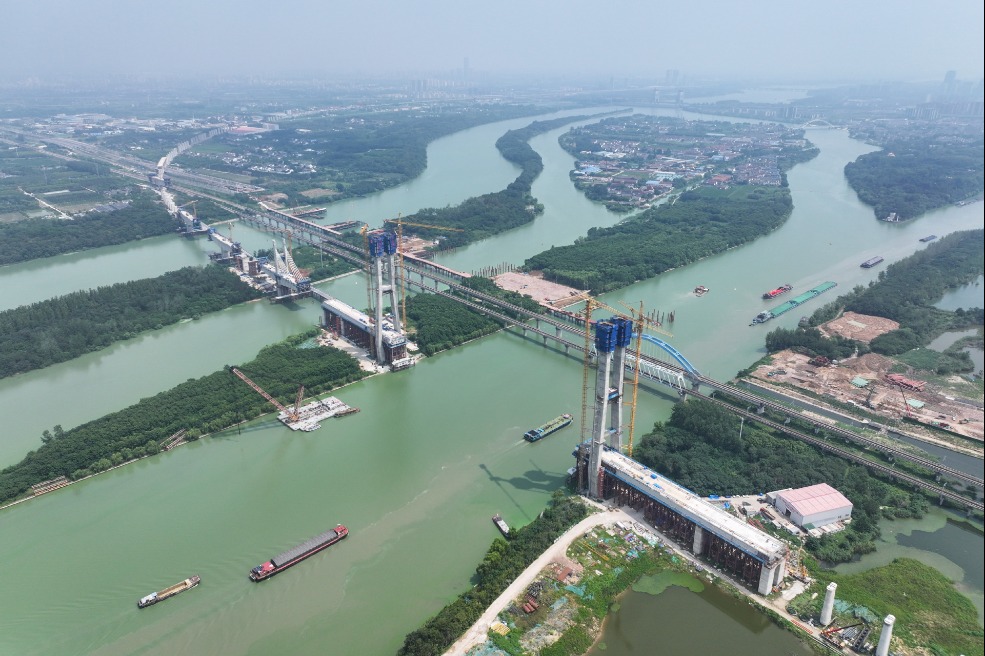Hong Kong advances as global asset management hub


Hong Kong is making strides in aspects of targeted tax reforms, a robust initial public offering market, and progressive virtual asset regulations — advances poised to transform Asia's financial hub into the world's largest cross-border asset and wealth management center, financial analysts said.
Eddie Yue Wai-man, chief executive of the Hong Kong Monetary Authority, said that the authority will continue to work closely with the government of the Hong Kong Special Administrative Region, the industry and the international community to drive policy innovation and market enhancements to further strengthen Hong Kong's competitiveness in the wealth management and asset allocation business.
"On the one hand, the Chinese mainland's economic growth and wealth accumulation, along with enhancements and expansions to various Connect Schemes, will further broaden the client base for Hong Kong's wealth management industry, while uncertainties are prompting international investors to adopt more proactive diversification strategies to better manage risks," Yue said.
According to the latest figures released by the Securities and Futures Commission in Hong Kong, total assets under management in Hong Kong grew 13 percent annually, reaching HK$35 trillion ($4.48 trillion) by the end of 2024. The assets under management of the private banking and private wealth management sector increased 15 percent year-on-year, and net fund inflows totaled HK$384 billion.
Forty-six banks expanded their private banking or private wealth management business in Hong Kong in 2024, and the assets under management of these institutions grew 14 percent in the first half of 2025, compared with the end of 2024, according to the authority's data.
"Hong Kong's commitment to refining its Unified Funds Exemption regime, fostering a vibrant IPO market, and establishing clear regulations for virtual assets sends a strong signal to global asset managers," said Vivian Chui, KPMG China's Hong Kong head of securities and asset management.
"These efforts demonstrate how effective regulatory support and targeted programs can be in shaping a dynamic and competitive asset management hub, positioning Hong Kong to capitalize on opportunities in the evolving financial landscape," she added.
Recent refinements to Hong Kong's Unified Funds Exemption regime focus on broadening its scope to include alternative assets such as private credit. These enhancements are likely to bolster the city's competitiveness by clarifying that both fund entities and their special purpose vehicles remain tax-neutral, thereby providing tax certainty.
Starting in August, Hong Kong has established a regulatory regime for stablecoin — a type of cryptocurrency whose value is pegged to another asset — including the issuance of digital tokens backed by fiat currencies. The regulatory framework also has constraints aimed at reducing risks and leverage in the crypto-related segment.
"We expect stablecoin will continue to be a gateway to crypto asset trading, for the convenience it provides as a trade pair in the blockchain-based environment," said S&P Global Ratings credit analyst Michael Huang. "By offering stablecoin-linked products or digital assets, Hong Kong banks may attract customers locally and across borders that are seeking offshore crypto exposures."
In the first half of 2025, the total transaction amount of digital asset-related products and tokenized assets in Hong Kong banks reached HK$26.1 billion, marking a 233 percent year-on-year surge and surpassing last year's total, the HKMA said.
"Hong Kong's status as a regional hub for asset and wealth management is also supported by its mature financial markets, resilient Linked Exchange Rate System, robust banking sector and vibrant capital markets, offering numerous investment and value-enhancement opportunities for global capital," said Yue, the HKMA chief executive.
In the first half of this year, funds raised through the Hong Kong IPO market exceeded HK$100 billion, making the city the top IPO market globally to date, HKMA data showed.
"The HKMA has ample ammunition to defend the (currency) peg in case the Hong Kong dollar converges towards the weak end of the band. Foreign exchange reserves have declined in recent years but remain well above regulatory levels," said Carlos Casanova, Asia senior economist at Swiss private bank Union Bancaire Privee.
The stability provided by the peg outweighs the negative effects even when Hong Kong faces cyclical challenges, as the business cycle of Hong Kong is more aligned with the Chinese mainland than the United States, Casanova added.
oswald@chinadailyhk.com
- Nine people pulled from Guangzhou landslide site, five remain missing
- China's phased free preschool education to benefit 12 million people this autumn semester
- China unveils plan to upgrade rural roads
- Women call for legally backed period leave
- 2 confirmed dead, 5 still missing after landslide in China's Guangzhou
- Seven researchers win 2025 Future Science Prizes






































